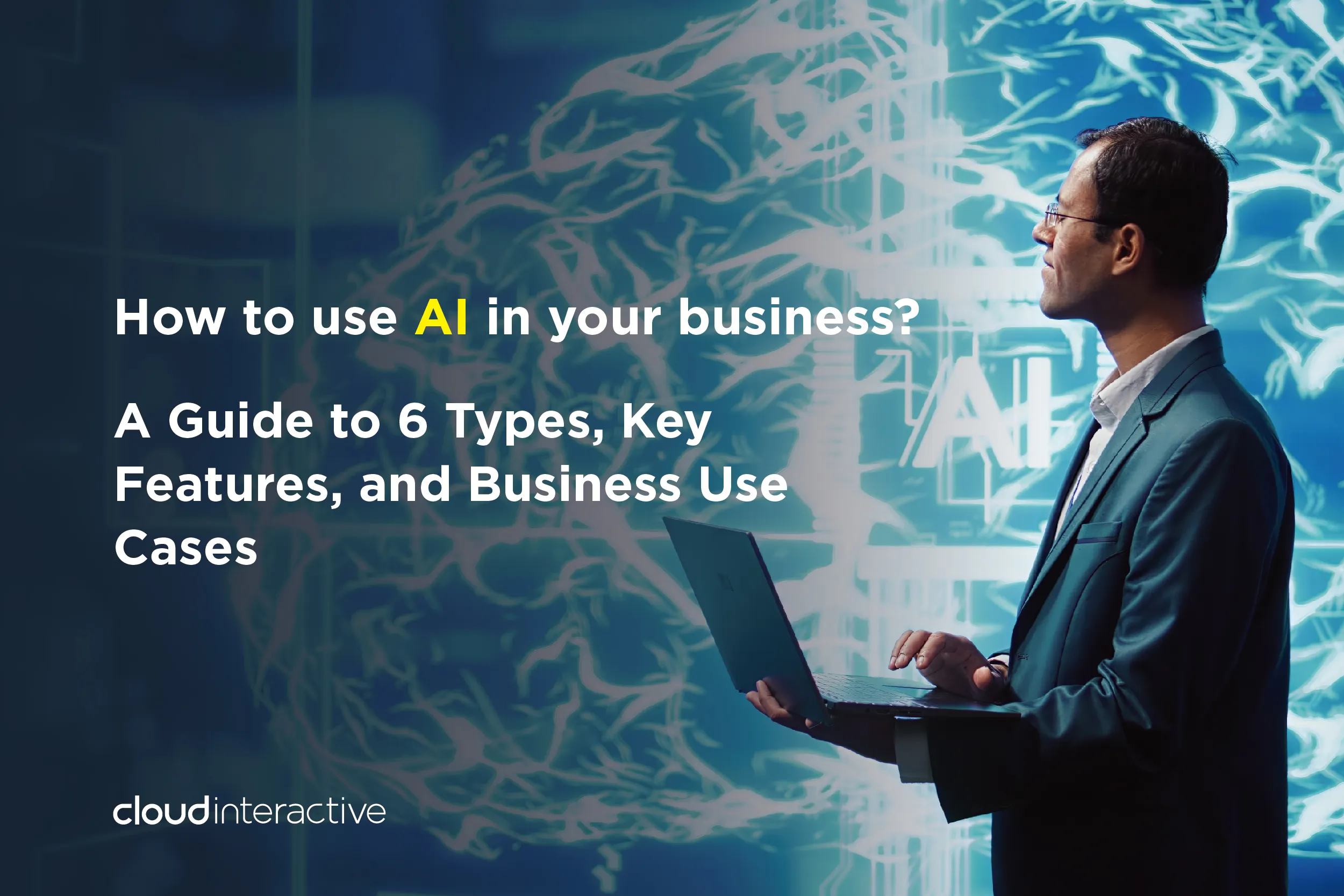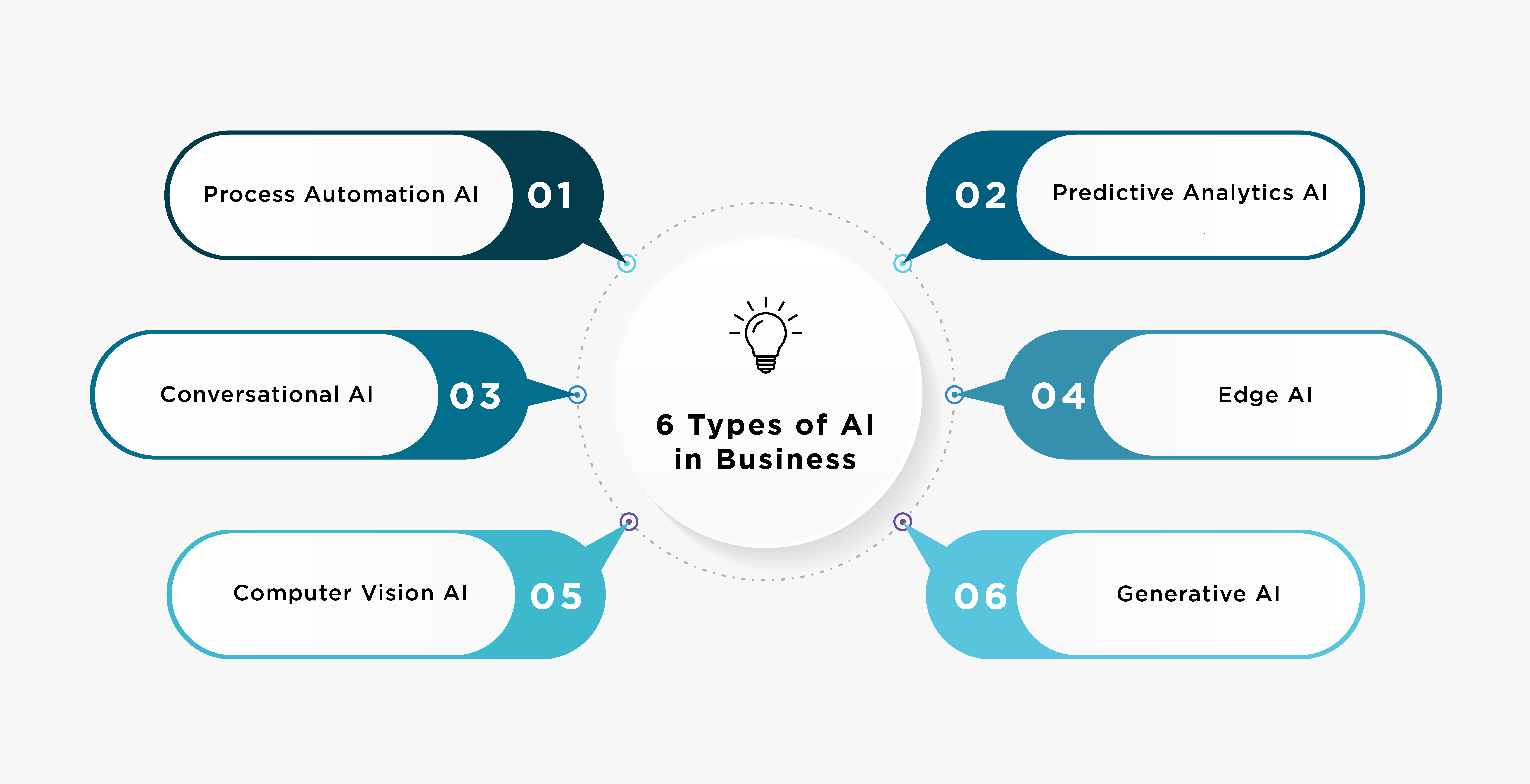
How to Leverage AI in Your Business: Key Comparisons, Expert Tips, and Real Use Cases
1. What is AI in Business?
With AI software now generating over $50 billion in yearly revenue worldwide, it’s clear that enterprise AI isn’t just a fancy new tool anymore. Today’s business world demands more than traditional approaches. AI has become crucial for success, with the global AI market hitting $515.31 billion in 2023. This massive growth shows how businesses are using AI to work smarter, serve customers better, and find new ways to grow. This shift from “nice-to-have” to “must-have” makes perfect sense. Modern businesses face huge challenges in handling massive amounts of data, delivering personalized customer experiences, and keeping up with rapid market changes.
Unlike general-purpose AI, AI in business refers to using artificial intelligence to tackle these challenges head-on, turning raw data into useful insights and handling complex tasks that would overwhelm even the most capable teams.
If you’re asking questions like, What’s the difference between general and enterprise AI? How can I use AI in my business? What are the best enterprise AI use cases?—this guide is for you. Let’s dive into the key types of AI in business, their practical applications, and how you can prepare to adopt AI for long-term success.
(1) 6 Types of AI in Business
Let’s start by looking into the types of AI businesses are using today. Understanding each technology will help you better understand their applications later.
Process Automation AI
Imagine you have a bunch of repetitive tasks at work that take up a lot of time or just need a lot of hands-on effort. Wouldn’t it be great if there was a way to speed things up so you and your team could focus on more important decisions? That’s where process automation comes in. The technology mimics human actions to complete repetitive routine tasks.
Two of the main tools used in process automation are Robotic Process Automation (RPA) and Intelligent Process Automation (IPA). These technologies are commonly used in the two following areas:
- Supply Chain Management: Automatically tracking inventory and processing orders to eliminate manual tasks.
- Customer Service: RPA can handle things like answering common questions or sorting through emails—meaning customers get quicker, more efficient service, and the team has more time to tackle the bigger issues.
Predictive Analytics AI
Predictive Analytics AI helps you look at past data to spot patterns and trends so you can predict what might happen in the future. It uses technologies like Machine Learning and Statistical Modeling to analyze the data automatically. It can apply to different areas like:
- Inventory Management: Predicting which products will be in demand, making it easier to keep the right amount of stock on hand.
- Healthcare: Analyzing patient data to forecast disease progression and improve treatment planning.
Conversational AI
Conversational AI relies on two key technologies: Natural Language Processing (NLP) and Natural Language Understanding (NLU). NLP helps machines learn and understand human language by analyzing it, while NLU takes it a step further by helping machines understand how language changes based on context. These technologies allow AI models to learn grammar rules and mimic human conversation, making their interactions feel more natural and human-like.
You’ve probably already interacted with conversational AI in your daily life. Some examples include:
- Chatbots: Providing instant responses to customer inquiries on websites.
- Voice Assistants: Devices like Amazon’s Alexa that understand and respond to voice commands.
Edge AI
Unlike cloud computing, which sends data to servers for processing, edge AI processes data directly on local devices, sometimes with built-in AI tools. This means you don’t have to worry about slow network speeds, interruptions, or the risks of uploading sensitive data to the cloud. It also gives you real-time feedback, which is super valuable in fast-paced situations.
The core technologies behind edge AI include machine learning and deep learning, which are mainly used in scenarios that require quick decision-making. Some examples include:
- Industrial Automation: It enables machines to make instant decisions based on the data they receive in real-time, without having to wait for data to be sent to a distant server.
- Autonomous Vehicles: It relies on edge AI to process data in real-time for safe driving.
Computer Vision AI
Combining technologies like Image Processing, Machine Learning, Deep Learning, and Computer Vision, this AI tool helps machines “see” and understand images. This means machines can look at pictures or videos, recognize patterns, and make sense of what they’re seeing. Computer vision can be helpful in different areas, such as:
- Manufacturing: It can help with quality control, so machines can spot defects or errors in products as they’re being made.
- Inventory Management: Computer vision can keep track of your stock by scanning and analyzing images of your products.
- Healthcare: It can analyze medical images like X-rays or MRIs, helping doctors detect diseases or issues more quickly.
Generative AI
Generative AI specializes in creating new content, like text, audio, video, and even code. It works using technologies like Large Language Models and Generative Adversarial Networks (GANs). By training on vast sets of data, generative AI learns to mimic human thinking and creates content that’s useful and practical. Some popular generative AI tools include:
- OpenAI’s ChatGPT
- Google Gemini:
As generative AI quickly becomes one of the most exciting technologies in both our work and daily lives, a forecast from Deloitte predicts that by 2025, 25% of companies will start using advanced generative AI tools — AI agents. And by 2027, that number is expected to double to 50%. AI agents can not only understand their surroundings and make decisions but also take action based on those decisions. Generative AI is the first step toward making AI agents a reality.
Next, we’ll dive into how businesses and individuals use generative AI differently.

(2) Diving Deeper into Gen AI in Business
Generative AI for Business vs. General Public
So, can I just use ChatGPT for my business? Technically, yes. However, there are a few differences between generative AI for business and general-purpose.
Below, we summarize the focus, advantages, and limitations of both types: Shared Foundation Models Both enterprise and public-facing generative AI often utilize similar foundation models:
- Large Language Models (LLMs) like GPT-4, LLaMA, or BLOOM
- Image generation models like DALL-E or Stable Diffusion
| Feature | Enterprise AI | Public AI |
|---|---|---|
| Customization | Fine-tuned on proprietary company data. | Pre-trained, limited customization. |
| Data Privacy | Prioritizes robust security and compliance. | May have less stringent privacy controls. |
| Integration | Seamlessly integrates with enterprise systems. | Standalone tools. |
| Ownership | Companies can own and control AI models. | Hosted by the provider. |
| Use Cases | Tailored to industry-specific needs. | Designed for general-purpose tasks. |
| Accuracy | Trained for specific tasks and industries. | More versatile for a wide range of tasks. |
Business versions of these tools give you more control and customization options than public versions. You can make sure everything matches your brand voice, follows industry rules, and keeps sensitive information safe. What really sets enterprise AI apart is how it learns your industry’s specific needs. While public tools are good for general use, business solutions understand your industry’s special terms, follow your sector’s rules, and align with your company’s specific needs. This makes them especially valuable for businesses looking to stay ahead while getting real results from their AI investments.
2. What Features of Enterprise AI Matter the Most?
When you’re exploring the best path for AI transformation in your business, there are a few crucial things to keep in mind. Let’s break it down into three main features of Enterprise AI that really matter.
(1) Information Security and Compliance as the Foundation of Trust
When integrating AI into business, ensuring data security and regulatory compliance must be top priorities. If you are using a publicly available AI model, any information you feed into the tool may be stored or ingested into the model’s training data, thus exposing sensitive brand material and data. You can take steps like encrypting your data, controlling who has access to it, monitoring for threats, and using surveillance tools to prevent data breaches.
Locally and Globally, AI governance standards are being established to promote responsible use, and it’s important to stay on top of these rules to avoid legal troubles. For example, in Taiwan, the Personal Data Protection Act (PDPA) lays out specific rules for how personal data should be collected, processed, and used. There’s also the Intellectual Property Law, which regulates AI-generated content and software development.
On a larger scale, the European Union introduced the world’s first comprehensive AI law in May 2024—the Artificial Intelligence Act (AIA). This new framework sets clear guidelines for how AI can be used and is expected to have a major impact on businesses everywhere. If you’re planning to adopt AI, staying compliant with these regulations should be one of your main goals.
(2) Scalability for Business Growth
Scalability is crucial for Enterprise AI because it ensures that AI systems can grow alongside your business, adapting to increasing data volumes, evolving demands, and complex workflows without losing efficiency or performance. Businesses can leverage advanced infrastructure like hybrid cloud platforms, containerization tools, and high-performance computing to handle expanding workloads. It also incorporates robust data management strategies, such as integrating diverse data sources and maintaining data quality while streamlining development and deployment processes through agile methodologies and MLOps.
(3) Customization for Precise Business Alignment
Customization is a key focus of Enterprise AI because it ensures that AI solutions are tailored to the unique needs, goals, and workflows of a business. Unlike generic AI models, customized AI leverages fine-tuning and proprietary data to deliver highly accurate and relevant results that align with a company’s specific objectives. This allows enterprises to address industry-specific challenges, enhance performance in specialized domains, and maintain control over sensitive data. Customization also enables seamless integration with existing systems, improving operational efficiency and ensuring that AI solutions work in harmony with current tools and processes.
For example, a financial services company can train its AI on proprietary financial data, while a healthcare organization can use its internal medical records to enhance accuracy in diagnoses or predictions.

2. How Can I Use AI In My Business? 6 Incredible AI Applications Transforming Enterprises
Now we’ve highlighted the features and focuses of enterprise AI, you know what you should be looking for. But where does it fit into your enterprise? Below, we’ll explore six areas, from marketing and customer service to finance and IT, where enterprise AI use cases are driving measurable success across industries—and how your business can do the same.(1) AI in Marketing
AI is being used in marketing to enhance creativity and improve customer engagement. Here’s how:- Inspiring Creative Ideas: AI can generate engaging copy, visuals, and personalized marketing campaigns tailored to customer preferences.
- Enhancing Customer Experience: Chatbots and virtual assistants can interact with customers in real time, offering product recommendations or solving their issues immediately.
- Data-Driven Decision Making: By analyzing data, AI helps in targeted marketing, audience segmentation, and market trend prediction.
- Improve Efficiency: AI automates repetitive tasks such as creating reports, updating content, scheduling posts, or improving search engine optimization (SEO).
(2) AI in Human Resources
In human resources, AI helps streamline processes and improve employee engagement. Here’s how:- Optimizing Recruitment: AI can generate job descriptions and interview questions and help screen candidates to find the right match quickly.
- Enhancing Employee Engagement: AI assists in creating internal communications, surveys, and event planning, as well as summarizing meeting reports.
- Data Insights for Performance Management: By analyzing historical data, AI helps create strategies for improving employee performance and retention.
(3) AI in Finance
- Building Financial Models & Forecasting Trends: AI can predict market fluctuations, simulate investment portfolio performance, and guide investment strategies.
- Automating Document Creation: From earnings reports to tax audits, AI can draft financial documents, saving time and ensuring accuracy.
- Market Research & Insights: AI can analyze competitors, market trends, and economic reports to uncover investment opportunities and track investor sentiment across social media.
(4) AI in Operations
In operations, AI streamlines processes and enhances overall efficiency as follows:- Process Automation: AI automates tasks like scheduling, inventory management, and data entry.
- Real-Time Reporting: It can generate KPI and performance reports on-demand, aiding decision-making and performance tracking.
- Predictive Maintenance: By analyzing data, AI can predict when equipment is likely to fail, helping prevent costly downtime. Optimizing Operational Efficiency: Advanced data analysis helps improve supply chains and logistics, enhancing business operations.

(5) AI in Customer Service
AI is revolutionizing customer service by offering faster and more personalized support as below:- Automating Customer Responses: AI-powered chatbots provide quick responses to customer inquiries, handling common issues and frequently asked questions.
- Personalized Recommendations: AI analyzes customer behavior to offer personalized product suggestions and responses.
- Knowledge Base Management: AI generates summaries of customer service documents and maintains up-to-date knowledge bases to support service teams.
Success Story: H&M’s AI Chatbot “Eva” Enhances Customer Service
H&M uses an AI chatbot named “Eva” to assist with customer service. Eva can answer common questions, help with product inquiries, track orders, and provide 24/7 support. Over time, Eva learns from past interactions, improving its responses. This system has increased efficiency, reduced the workload on customer service staff, and increased customer satisfaction by providing immediate responses.
(6) AI in IT & Cybersecurity
AI is also making a significant impact on IT and cybersecurity by improving security and system efficiency, here’s how:- Code Generation & System Optimization: AI can assist in writing and optimizing code, shortening development cycles, and identifying infrastructure inefficiencies.
- Threat Detection & Response: AI analyzes data to detect system anomalies and simulate attack scenarios, improving threat detection and response capabilities.
Success Story: Amazon Leverages AI to Counter Billion Daily Cyber Threats
Amazon monitors nearly a billion potential cybersecurity threats daily. As hackers increasingly use AI tools, Amazon integrates AI into its security systems to track and analyze network activities from different IP addresses. This advanced system helps detect previously unnoticed threats, collaborating with government agencies to combat cybercrime and protect its operations.
With these AI use cases showcasing the potential for business growth, we will next take you to explore how to implement these technologies effectively to maximize their impact.
Thinking of implementing Enterprise AI?
From selecting the right AI models to building tailored solutions, we guide you every step of the way to achieve your goals. As a certified IBM AI service partner, we specialize in delivering cutting-edge enterprise AI solutions that drive real results.
How To Implement AI in Business? 4 Crucial Steps.
(1) Recruiting Talent and Developing Skills
By investing in upskilling your workforce, you’ll be able to unlock AI’s full potential and drive your business forward. It includes hiring professionals like data scientists and machine learning engineers, as well as training your current employees to understand and leverage AI for decision-making, innovation, and operational efficiency.
(2) Mastering AI Compliance to Drive Innovation
To achieve this, developing a robust compliance framework is key—this includes conducting ethical impact assessments, prioritizing transparency in AI decision-making, establishing strong data governance practices, and ensuring human oversight. Leveraging AI-powered compliance tools can streamline processes, from analyzing regulatory texts with natural language processing to forecasting compliance risks using predictive analytics.
(3) Identify Key AI Use Cases Through Workshops
- Learn the core principles of AI and its applications.
- Assess risks, governance requirements, and business needs.
- Collaborate on discovering tailored use cases that solve real business challenges.
By creating a clear roadmap for AI adoption through these workshops, businesses can focus on human-centric projects that deliver measurable results and set the stage for scalable AI deployment.
(4) Preparing Reliable Data for a Secure AI Future
When you’re deploying AI in business, one of the most important things to consider is the quality and accessibility of your data. For AI systems to work effectively, they need to access, integrate, and analyze data from different sources without any roadblocks. But here’s the catch: if your data isn’t clean or well-organized, it can slow everything down, especially if you’re still using outdated infrastructure while handling large volumes of data. For businesses adopting AI, especially generative AI, it’s crucial to clean and structure your data properly. This not only enhances the accuracy of your AI models but also helps minimize biases and reduces the chances of generating misleading or incorrect information. By getting your data in shape, you’re setting the foundation for more reliable and secure AI results in the future.Final Thoughts
So, why should businesses like yours invest in custom AI? It’s simple: while it requires more time, resources, and expertise, the payoff is significant. Custom AI allows you to unlock the full potential of AI, creating highly tailored applications that directly address your business needs. This not only helps you stay ahead of the competition but also ensures that your AI strategy aligns with your long-term goals.Watsonx: Your Custom AI Solution for Business
By Cloud Interactive
Meet the masterminds behind the curtain at Cloud Interactive. We're not just software developers - we're also a content crew fuelled by caffeine and a thirst for knowledge. We translate tech jargon into plain English, dissect industry trends, and craft helpful tips that are informative and engaging. So, buckle up and join us on a journey through the ever-evolving and exciting world of technology!


